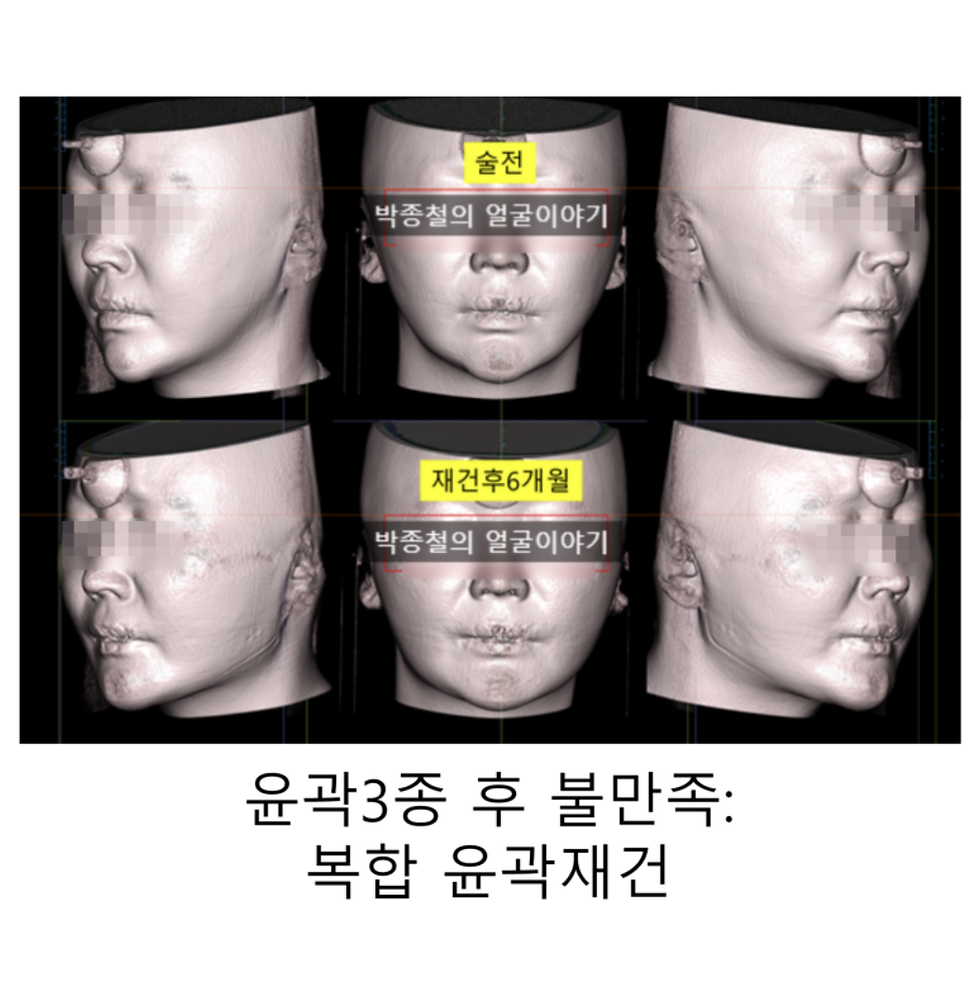Chin Reduction Surgery: An Overview
- Dr. Park

- Dec 4, 2024
- 3 min read
Chin reduction surgery, also known as chin tip reduction, focuses on reshaping and reducing the size of the chin, which is part of the mandible or lower jawbone. The mandible can be divided into three main parts:
Symphysis Menti (Chin Tip Bone)
Body of Mandible (Midsection)
Ramus (Angle of the Jaw)
The chin tip bone, highlighted in yellow in the illustration, is the area of interest for this procedure.

What Is Chin Reduction Surgery?
Horizontal Reduction
Decreases the width of the chin while maintaining its height.
Vertical Reduction
Shortens the chin to reduce the overall face length.
Horizontal Chin Reduction
This procedure narrows the chin tip, creating a slender and more delicate appearance. Below are examples of changes observed post-surgery:
Soft Tissue Changes - Soft tissue changes mirror skeletal alterations, enhancing the overall aesthetics. Another example demonstrates similar improvements in skeletal and soft tissue structures.

Types of Chin Reduction Surgery
Skeletal Transformation - Pre- and post-surgical comparisons show significant narrowing of the chin bone.

Types of Chin Reduction Surgery
Vertical Chin Reduction
Vertical chin reduction focuses on shortening the overall length of the face. Many patients express a desire for a shorter, smaller face to achieve a more proportionate look.
Designing the Ideal Proportions
The surgery often aims to bring the face closer to the Golden Ratio (1.618) for optimal aesthetics. For example, pre- and post-surgical analyses demonstrate improvements in patients' proportions.
Combined Skeletal and Soft Tissue Results
Both skeletal and soft tissue changes align to create a harmonious and balanced facial contour.


Importance of Mandibular Angle Surgery
Addressing the posterior mandibular cortex significantly impacts the face's overall width. While chin reduction surgery can technically extend posteriorly, it risks compressing critical mental nerves, making additional incisions necessary. Thus, mandibular angle surgery provides a safer and more comprehensive solution.
Why Combine Chin Reduction with Mandibular Angle Surgery?
While chin reduction surgery alone can create a slimmer look, combining it with jaw reduction surgery (mandibuloplasty) often yields more dramatic and harmonious results. Here's why:
Preventing Secondary Angles: Chin reduction alone can sometimes create a noticeable step-off or secondary angle where the reshaped chin meets the wider jawline. Combining it with jaw reduction ensures a smooth, continuous jawline without any irregularities.

chin reduction surgery Preventing Secondary Angles Maximizing Facial Width Reduction: Chin reduction primarily affects the frontal appearance. To achieve a significant reduction in facial width from the side profile, jaw reduction surgery is necessary. This combined approach creates a more three-dimensional and balanced facial structure.

chin reduction surgery Enhanced Safety: Extensive chin reduction can increase the risk of damage to the facial nerves. By combining it with jaw reduction, surgeons can achieve the desired aesthetic outcome while minimizing the risk of nerve injury.
Other Alternatives for Chin Reshaping
In cases of microgenia (short chin), chin advancement surgery may be a better solution than reduction. Adjusting the anteroposterior position of the chin alone can create a more slender appearance without reducing width.

Choosing the Right Chin Reduction Technique
The ideal chin reduction technique depends on individual factors such as facial structure, bone characteristics, and desired aesthetic goals. A thorough consultation with an experienced oral and maxillofacial surgeon like Dr. Park Jong-chul is crucial to determine the most suitable surgical plan.
Contact Us
If you have any questions or would like to schedule a consultation, please don't hesitate to contact us. Dr. Park and his team are dedicated to providing personalized care and achieving optimal results for every patient.



Comments